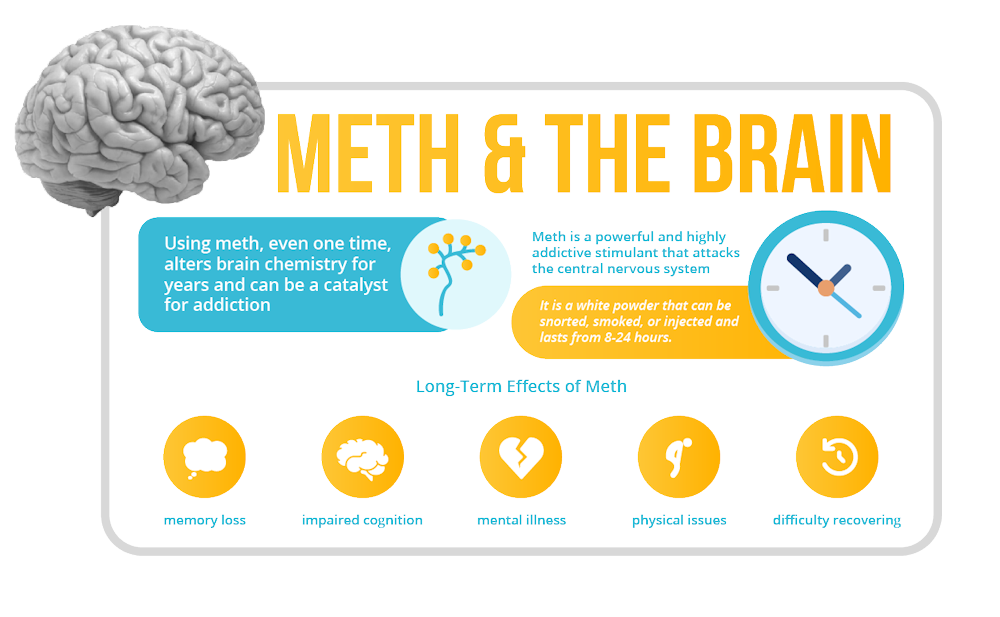Have you ever thought about what meth does to your brain? We all know it’s bad news, but ever wonder why exactly? Well, meth is this seriously addictive stimulant that interferes with your central nervous system and throws your brain for a loop. Even trying it just once can lead to some seriously messed-up health problems and get you hooked. The scary part? Meth doesn’t just mess with your head temporarily; it can change your brain in some pretty lasting ways.
Learn more about what meth does to your brain and how Free by the Sea can help you or someone you know break free from its grip. We specialize in providing support and treatment for those struggling with meth addiction, offering a path toward recovery and reclaiming a healthier, drug-free life.
What Is Methamphetamine?
Jump to Section
Methamphetamine, also known as meth, is a powerful and highly addictive stimulant that affects the central nervous system.
Meth is usually a white, bitter-tasting powder that is easily dissolved in water or alcohol. It can be snorted, smoked, injected, or ingested orally. No matter the method of administration, meth delivers an intense rush of pleasure and euphoria, followed by a prolonged high that can last 8-24 hours.
Using meth, even just once, alters the brain in ways that can last for years. It causes a spike in dopamine levels, which makes you feel good and gives you a burst of energy and focus. But over time, meth destroys dopamine receptors in the brain, limiting your ability to feel pleasure from normal activities. This is what makes the drug so addictive and all-consuming.
Chronic meth use causes changes in the brain that can lead to problems with verbal learning, memory, and emotional regulation. These brain changes may persist even after someone stops using the drug. However, some functions may return over time with sustained abstinence.
Understanding the nature of methamphetamine, its effects, and the potential risks associated with its use is crucial for promoting awareness and addressing the challenges posed by this highly addictive substance.
Short-Term Effects of Meth on the Brain and Body
When you take meth, the drug quickly enters your bloodstream and travels to your brain. This causes an intense rush of dopamine, the “feel-good” hormone, in your brain. The effects are almost immediate.
Increased energy and alertness
Meth gives you a burst of energy and suppresses your appetite. You may experience hyperactivity, restlessness, rapid speech, and extreme focus or concentration.
Euphoria and pleasure
The dopamine rush from meth use causes an intense high and feelings of euphoria. You experience a flood of pleasurable sensations and rewards. This reinforces the behavior and makes you want to keep using meth to chase that high.
Insomnia
The energy and alertness from meth can last up to 24 hours. This often leads to insomnia, restlessness, and a lack of sleep for days at a time. Lack of sleep only enhances the negative health effects of meth use.
Dilated pupils
Meth use can cause pupil dilation (enlarged pupils), reflecting the drug’s impact on the autonomic nervous system.
Decreased appetite
The combination of decreased appetite and inadequate nutrient intake may lead to physical weakness, compromised immune function, and an increased susceptibility to various health complications in the short term.
The short-term effects of meth on the brain and body can be intense and even pleasurable at first. However, repeated use or high doses of meth, especially over a short period, can be dangerous and even life-threatening. The negative health consequences tend to accumulate quickly, even after just one use.
Long-Term Effects of Methamphetamine Addiction
Long-term meth use can cause severe damage to your brain and body that persists even after you stop using the drug. Some of the most significant long-term effects of meth include:
Memory loss and impaired cognition
Meth directly impacts areas of the brain involved in memory, emotion, reward, and cognition. Long-term use can lead to deficits in attention, learning, memory, and decision-making that persist for years after quitting the drug.
Mental health issues
Chronic meth use is associated with severe mental health issues like psychosis, hallucinations, paranoia, and delusions. Even after quitting meth, many people continue to struggle with anxiety, depression, insomnia, mood swings, and suicidal thoughts.
Physical health problems
Long-term meth use takes a major toll on physical health and appearance. People who use meth for many years often experience severe weight loss, skin sores, dental problems (“meth mouth”), and premature aging. They are also at higher risk of stroke, heart attack, lung disease, and other medical issues.
Difficulty recovering
The longer and more frequently you use meth, the harder it is for your brain and body to heal. A complete recovery can take years of abstinence and treatment. Many people who have used meth for a long time struggle to quit, and even with treatment, relapse rates tend to be high due to the lasting impact on the brain’s reward circuit.
While the effects of long-term meth use can be devastating, the good news is that recovery is possible. The brain and body have an amazing ability to heal over time. With sustained abstinence, a healthy lifestyle, social support, and comprehensive treatment, people can overcome meth addiction and go on to live happy, fulfilling lives.
Signs of Meth Addiction and Dependence
If someone you know is using meth, there are a few signs of drug addiction to watch out for. The short-term effects of meth can appear quickly, while the long-term effects tend to accumulate over time.
Using meth, even just occasionally, can lead to addiction. Some indications that meth use has become problematic include:
- Needing to use meth just to feel “normal” or function daily. Meth becomes necessary to cope with stress, socialize, or work.
- Strong cravings and urges to use meth are hard to resist. Thoughts of using meth dominate a person’s mind.
- Continuing to use meth despite the negative consequences. This could be health issues, financial troubles, relationship problems, or legal trouble. But the person keeps using meth anyway.
- Giving up or reducing important activities because of drug use. Things like hobbies, social lives, and work or school responsibilities start to suffer.
- Building up a tolerance to meth so that more of the drug is needed to achieve the desired high or rush. This often leads to progressively higher and more frequent doses.
- Experiencing withdrawal symptoms when not using meth, like depression, anxiety, tiredness, or physical discomfort. Using meth relieves these withdrawal symptoms, fueling further use.
- Loss of control over meth use. The person may intend to only use a little bit but end up on a “binge” and using much more than planned. They struggle to limit their meth intake.
Encouraging the person to speak with their doctor or reach out to a rehabilitation center is the most effective way to help when multiple signs of meth addiction are present. Meth addiction is a serious medical condition and overcoming it typically requires professional support and treatment.
Treatment Options for Meth Addiction and Recovery
Treatment for meth addiction typically involves both medical detox and behavioral therapy. The good news now is that there are several options available to help you overcome an addiction to meth and stay committed to your recovery.
Medical Detox
The first step is detoxing from meth, which can be difficult and even dangerous without medical supervision. Inpatient or outpatient detox provides 24-hour medical monitoring to help you safely withdraw from meth. Medications may be used to treat withdrawal symptoms like depression, anxiety, and cravings. Detox usually lasts around 7-14 days.
Residential Rehab
For severe meth addictions or addictions that involve mental health conditions, residential rehab may be recommended. You live at the treatment facility for several weeks or months and participate in intensive individual and group therapy. Residential rehab removes you from environments and triggers that can threaten your sobriety.
Outpatient Rehab
If you have a strong support system at home, outpatient rehab may be an option. You attend therapy sessions, counseling, and meetings several times a week while continuing to live at home. Outpatient rehab requires strong motivation since you have more exposure to triggers and cravings in your normal environment. For the best chance at success, enrolling in an intensive outpatient program (IOP) with a minimum of 9-15 hours of treatment per week is recommended.
Aftercare and Support Groups
To maintain sobriety, an aftercare plan should be put in place before leaving rehab. This often includes ongoing counseling and therapy, participation in support groups like Narcotics Anonymous (NA), and lifestyle changes. Making new friends who are committed to sobriety and avoiding triggers can help prevent relapse in the long run.
Overcoming a meth addiction is challenging, but with a commitment to treatment, you can recover and build a healthy new life without relying on drugs. The rewards of sobriety are well worth the effort. Staying focused on your goals will help you get through difficult days and keep you on the path to recovery.
Treatment for Meth Addiction at Free by the Sea in Ocean Park
If you or someone you know is struggling with meth addiction, taking the first step toward recovery is crucial. Free by the Sea in Ocean Park is here to help! Our comprehensive range of treatment programs and evidence-based therapies provide a supportive environment to overcome addiction. Whether you’re seeking outpatient or residential treatment, our dedicated team is committed to guiding you on your journey to recovery.
Don’t wait any longer to seek the help you deserve. Contact us to learn more about our services and take the first step towards a brighter future. Remember, there is hope and support available to you.

Dr. Richard Crabbe joined our team in 2019 as our psychiatrist and medical director. He attended the University of Ghana Medical School where he became a Medical Doctor in 1977. From 1978 through 1984, he was a medical officer in the Ghana Navy and provided a variety of services from general medicine to surgeries. He received his Certificate in General Psychology from the American Board of Psychology and Neurology in 2002.






